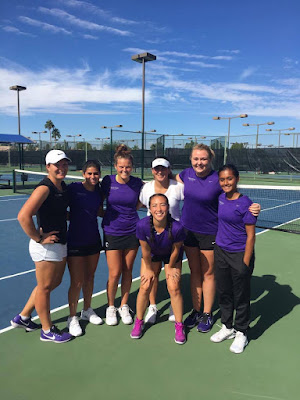Why EVERY Female Junior Tennis Player Should HAVE to Go To College
At 17, I had a big decision to make. Would I go pro or accept a scholarship to play college tennis? For me, the decision was actually an easy one: my highest International Tennis Federation (ITF) ranking was 130 and I had little experience playing professional tournaments. While many of my peers also decided to go the college tennis route, some junior female players I knew opted to turn pro and join the WTA Tour.
Figuring out whether to go to school or turn pro is something that many young female juniors wrestle with at some point. I talk to a lot of recruits and feel that they don’t all have access to the information they need to make the best decision possible. Studies show that only higher income in term of prize money, and higher performance in terms of ranking reduce quit behavior.3 This means that when a player is not ranked high enough, she does not make enough money and the chances of her quitting are higher. Additionally the sad reality is that most female professional tennis players are not be able to make enough money during their tennis career to allow allow them to retire with any savings.
Many juniors will go pro without fully assessing their options, yet for the vast majority, the benefits of playing college tennis far outweigh going pro. Sadly, the system isn’t setup to help them see this.
I believe young tennis players would benefit from a universal rule, like basketball and football, where players must wait a year or three before turning pro. This rule would ensure teenagers get an education that will benefit them well beyond their tennis playing years. And if their collegiate results determine that they are in fact “too good” for the college level, then the decision to go pro would be more valid.
 |
| 2016 Washington Women's Tennis Team |
Being a student-athlete helps set up young adults for future success. By equipping them with a college degree, they are opening countless doors for future opportunities. Isn’t that our job as coaches? To equip our players with as many tools as possible so they can live rich and fulfilling lives? By giving young 16 year olds a decision to pick college or turn pro, we are not equipping them to the best of our abilities.
Now, let’s discuss some common questions that some of you might be itching to debate:
Q: What if a player is “too good” to play college tennis?
A: By having a system where all players must attend college for at least one year, everyone starts on the same playing field. Therefore, all players will be “too good” which will only improve the quality of college tennis.
Q: If every player has to go to college to be a pro, wouldn’t there be too many players for college tennis?
A: There are many different solutions to this problem. First, allow for bigger teams with more scholarships. Who’s going to pay for it you ask? I argue that by bringing professional quality tennis to college, changing the scoring system (to be discussed in another article) and making college tennis more engaging we would attract more fans, more donors, more sponsorship opportunities, etc.
Q: Wouldn’t certain schools have the advantage because of their bigger budget, therefore recruiting the very best tennis players in the world?
A: This statement is true today and wouldn’t change if we make future pros go to college. The simple truth is that top schools have more money to recruit better players.
 |
| Credits: University of Washington Athletics |
Q: By forcing thousands of players to attend college before turning pro, aren’t you denying access to players that might not be as good that right now, have the opportunity to get a scholarship?
A: There are over 1,000 college tennis teams in the US and in 2017, over 10,000 female athletes played on a collegiate team.2 By ensuring everyone heads to college before becoming a pro, you might instead see more depth, meaning D2, D3, NAIA and NJCAA would get stronger. Furthermore, by increasing the number of girls on each team, we could easily accommodate all players, raise the level of college tennis, and in turn try to make college tennis more exciting for fans.
Q: What about players who don’t speak english?
A: Maybe the rule isn’t you must go to college in the US. Maybe you must simply attend college for 1 year before you turn pro and cannot participate in any money tournaments. Maybe other countries would create college leagues where players can train and compete and start their education.
Q: Who funds the athletes when they leave college and turn pro?
A: Who funds 16 year olds who try to go pro? At least by attending college, you see what is available to you realistically. Maybe you meet donors who want to support your dream. Maybe the college you attend becomes your training base. Maybe your teammates want to go on Tour with you which can make costs more affordable.
Q: Don’t college tennis coaches have a difficult enough job without having to deal with player turnover, bigger teams, etc...?
A: Making players attend college for at least one year could create an opportunity to hire recruiters on staff which would alleviate some stress off the coaches. Basketball and football teams have coaches who are specialized in recruiting. Why can’t tennis have that as well?
Final Thoughts
I acknowledge that this argument is not perfect. There is the question of prize money, the question of is college really for everyone, and the question could women’s college tennis be lucrative enough? All these questions would have to be thought through before implementing such a radical change. But the ultimate question is why are we allowing 16 year olds to make a decision that will impact the rest of their lives?
I LOVE everything about college athletics and college tennis. I want EVERYONE to experience it. I strongly believe that a universal college rule could seriously improve college tennis, professional tennis, and the lives of tennis players. This post might seem ludicrous to some, but think about it – don’t we want female tennis players to be the best they can be on and off the court? Don’t we want to develop future leaders? Don’t we want to equip them with all the tools possible so they can live successful and fulfilling lives? I believe the answer to all these questions is yes and I believe this starts by making teenage tennis players head to college, have a routine, have a bit of fun, train hard, compete for a University and, after a year, reevaluate where they stand and what the best move is for their tennis career and their lives.
--
References
1 Moen, F., Myhre, K. (2017), Can the working alliance between coaches and athletes explain athlete burnout among junior athletes? The Sport Journal. 18. 41-56.
3 Geyer, H. (2010), Quit behavior of professional tennis players. Journal of Sports Economics. 11(1) 89-99. http://journals.sagepub.com/doi/pdf/10.1177/1527002509336210


Comments
Post a Comment